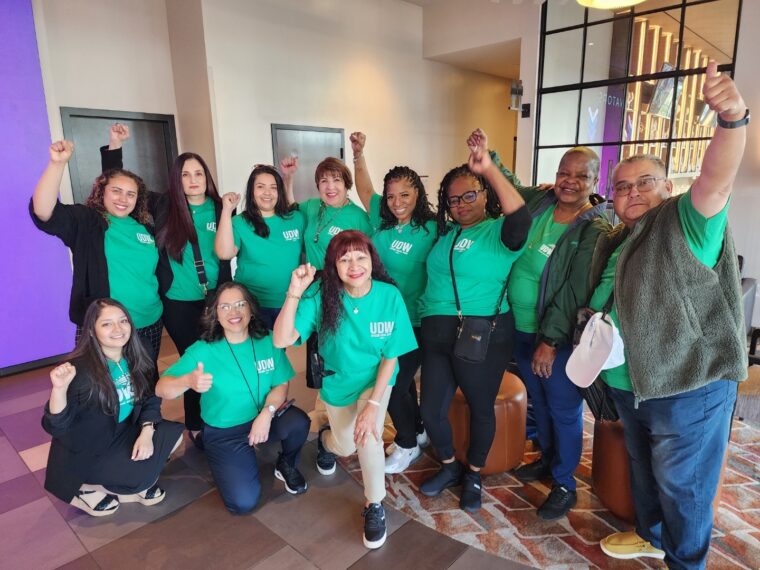This week UDW leaders and members joined hundreds of care workers from across the country in D.C. at the first-ever Care Workers Can’t Wait Summit hosted by our partners at National Domestic Workers Alliance.
At the summit, we connected with other caregivers, including home care providers, family child care workers, and CNAs. We marveled at how, in spite of our geographical differences, so many of our stories and experiences and struggles are fundamentally the same – we care for our nation’s loved ones and children, but who cares for us?
Several elected leaders stood with us this week to answer that question.
First, President Joe Biden hosted a group of workers in the White House Rose Garden, including UDW members Sandy Moreno, Luz Cedeno, and Marilyn Smith and leaders Doug Moore and Johanna Hester.

There, we looked on as the President signed an Executive Order that included $150 billion dollars to expand access to long-term care and improve wages for home care workers, and $600 billion to expand access to child care and improve wages for child care workers.
“Being at the White House was just… awesome,” UDW Executive Director Doug Moore said, struggling to find the words to describe the momentous occasion. “We didn’t expect this. It’s historic.”
Later that evening, Senators Bernie Sanders and Bob Casey hosted a town hall featuring a CNA from North Carolina, a home care worker from Pennsylvania, and UDW child care member Miren Algorri of San Diego County.

“Direct care workers, all of you, are the true heroines and heroes of our economy, and it’s about time that we treat you with the respect and the dignity that you deserve,” said Senator Sanders, addressing the crowd of over 200 care workers.
“We have carried the weight of the world on our shoulders without the care or recognition our work deserves,” Miren echoed in her testimony. “We are more than ready to tear down the broken systems to make way for the futures we deserve.”
At the summit UDW members attended workshops and participated in panels, exchanging stories, hugs, and even phone numbers. UDW home care worker Sandy Moreno opened day one by telling her caregiving story, and how caregivers in Kern County came together to enact term limits on County Supervisors who refused to invest in the IHSS program.
“This work is hard, but we do it because we care,” she said. “We do it because it’s essential. We do it because it’s the work that makes all other work possible.”
She brought some to tears, fired up the crowd, and received a standing ovation.
When asked about what attending the summit meant to them, here’s what our members had to say:
“I’m delighted to be here,” said IHSS provider Diana Casanova from Madera County. “I’ve learned so much about what our brothers and sisters across the nation are fighting for. It’s empowering.”

“I’m delighted to be here,” said IHSS provider Diana Casanova from Madera County. “I’ve learned so much about what our brothers and sisters across the nation are fighting for. It’s empowering.”
Diana Cassanova, IHSS Provider, Madera County

“It means a lot to see that we’re not in this alone,” said Luz Cedeno, a home care worker from Orange County who has been a UDW activist for 13 years. “We’re in this together, and we’re not letting go or giving up.”
Luz Cedeno, IHSS Provider, Orange County

“It was a pivotal moment for me, seeing my union sister Miren up there with Bernie Sanders,” reflected Riverside County child care member Joana Herrera. “If we work together and advocate, we can do anything.”
Joana Herrera, Family Child Care Provider, Riverside County

“In a lot of ways, California is paving the way and making progress where others haven’t,” said Donise Keller, a child care worker from Contra Costa County. “They’re looking to us to see what can be accomplished, but the funny thing is, we still have a long way to go. There is so much to be grateful for, but still so much more we need to do.”
Donise Keller, Family Child Care Provider, Contra Costa County
“I can’t take love to the bank,” added Charlotte Neal, child care provider from Sacramento County. “Love doesn’t pay my mortgage. I take care of everybody else, so who’s gonna take care of me?” A sentiment shared by the hundreds of care workers who attended this week’s summit. But luckily, Miren reminded us, “Care workers are the ones who have the solutions to these problems. We just need somebody to listen.”
And this week in D.C., for a few days at least, care workers were heard.



